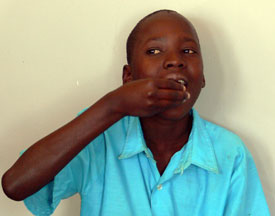As of November 2006, more than 2,800 health facility staff in 34 districts had been trained to use ACT. The President’s Malaria Initiative (PMI) is spending to train workers in how to handle uncomplicated malaria cases.

Steven taking his first dose of artemisinin-based combination therapies (ACTs) at the hospital with a cup of water — treatment for three days will completely eliminate the malaria parasites from his body. Source: Karie Atkinson/USAID
Health workers in Uganda are getting on-the-job training in how to properly manage artemisinin-based combination therapies (ACTs), considered among the most effective ways today to cure people who have been diagnosed with malaria.
As of November 2006, more than 2,800 health facility staff in 34 districts had been trained to use ACT. The President’s Malaria Initiative (PMI) is spending to train workers in how to handle uncomplicated malaria cases.
One of their patients was Steven Opunya, 11, of Northern Uganda. He began treatment with ACT at a hospital in the Gulu district, which is about three miles from his home.
“I came to the hospital because I was suffering from a headache and general body weakness,” said Steven, who came to the facility alone because his mother was farming.
One of five children, Steven has missed two weeks of school this year alone due to malaria. The last time he had malaria was in July 2006. He has now been diagnosed with malaria again and lines up at the hospital pharmacy to pick up lifesaving drugs, known as artemisinin-based combination therapies (ACTs), which are funded through the PMI. A three-day treatment course, which costs around $1 on average, will cure him, enabling him to go back to school.
In Uganda, malaria contributes to poor academic performance. Mathias Seruwu, a teacher at St. Augustine’s College in Wakiso district in Uganda, highlights the disease’s adverse impact on education. “Teachers who are sick are unable to teach, and as a result, lessons go untaught, and children get behind in school,” says Mr. Seruwu. “And, students who get malaria become weak and cannot attend classes and fall back,” he continues.
In 2007, PMI plans to distribute up to three million pediatric doses of ACTs for free in Uganda worth about $2.75 million.
